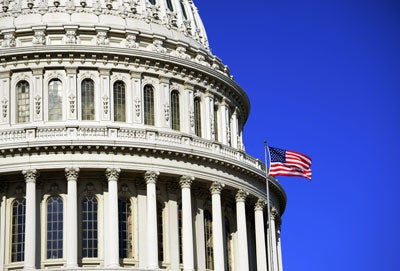Members of Congress will vote Wednesday to freeze their salaries through 2013 and impose the same pay limitation on non-military federal workers.
The vote in the U.S. House comes just two days after the Congressional Budget Office confirmed that federal workers are paid 16 percent more in total compensation — a conclusion similar to research conducted by The Heritage Foundation and American Enterprise Institute.
“Study after study has shown that when compared to the private sector, the federal government on average pays more than required to recruit and retain a skilled workforce,” said Rep. Dennis Ross (R-FL), chairman of a House Oversight and Government Reform subcommittee on federal workforce. “H.R. 3835 asks Members and federal employees to share in the sacrifice necessary to help millions of Americans suffering under the Obama economy.”
The legislation, sponsored by Rep. Sean Duffy (R-WI), extends the current pay freeze through Dec. 31, 2013. It will be considered under suspension of House rules, meaning a two-thirds majority is required for passage.
Even if the bill is signed into law, most federal employees will still receive a raise under federal personnel guidelines. Salaries increased an average of $1,303 during the current pay freeze.
“Federal employees will continue to receive salary increases under routine adjustments driven by the passage of time that move employees into higher salary brackets, regardless of performance,” Ross said. “Last year, more than 99.9 percent of federal employees eligible received these within grade step increases.”
This is one reason Heritage’s Jason Richwine and James Sherk have argued for a more fundamental overhaul of the federal pay and benefits system, which would have a more substantive impact than a one-year pay freeze.
Among Heritage’s recommendations: Congress should implement a pay-for-performance system, expand the contracting of federal work to private companies, reduce the generosity of federal benefits, and end the near-absolute job security for underperforming federal workers.
Democrats, many of whom criticized Heritage’s research on federal pay, vowed to oppose the pay freeze unless it was amended. They want the legislation restricted to only members of Congress, who earn $174,000 annually.
“The merits of pay increases for federal employees should be debated separately from our consideration of pay for Members of Congress,” wrote a group led by Rep. Elijah E. Cummings (D-MD). “While we are not opposed to a freeze on Members’ pay for fiscal year 2013, we will not support a pay freeze for federal employees for a third consecutive year.”
Despite recent pay limitations on federal employees, CBO’s report revealed they still outpace private-sector workers by a wide margin. In addition to receiving total compensation 16 percent higher, they earn 2 percent more in cash wages and a significant 48 percent more in benefits.
Richwine and Sherk noted that while CBO’s work is not perfect, its conclusions are similar to research conducted by Heritage and AEI.
“The federal pay system is broken,” Sherk said in testimony before the House Oversight and Government Reform Committee last March. “Economic research consistently shows that federal employees earn more than they would in the private sector.”
